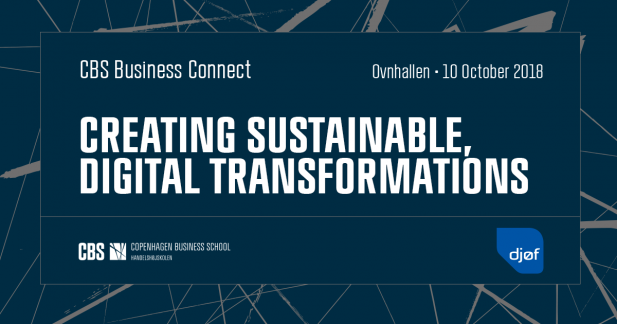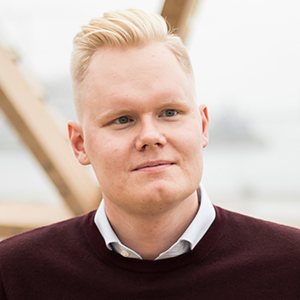How do we get through digital transformations sustainably?

What do digital transformations mean for us as a society? What will they mean for employers and employees? And what skills must students and graduates possess to remain relevant on the job market? The answers to these questions and many more will be addressed at the next CBS Business Connect event: ‘Creating sustainable, digital transformations’.
We have spoken with CBS researcher and Associate Professor Ursula Plesner, who studies how digital technologies transform various aspects of our work lives and professional relationships. She urges us to move with caution and take time for reflection. Tech investor Christian Jantzen, who we also spoke with, believes that we are lagging behind and cannot get up to speed fast enough.
“We have to carefully consider what makes sense.”
- In recent years, a radical digitisation has been taking place in the public sector, in the school system, the police, the military and the health sector. I see that major concerns exist about being left behind if you aren’t among the first movers, says Ursula Plesner, who will be one of the panellists at the next CBS Business Connect, adding:
- At the same time, there are managers in companies and organisations getting stressed out by the specific tasks and challenges accompanying digitisation. Many work processes become more transparent and visible due to digitisation, which means that managers either have to consider what to do with the detailed data themselves or spend a staggering amount of time making decisions about how the data should be applied. Sometimes digitisation means that some operational considerations end up overshadowing other important managerial tasks.
- With digitisation and automation it’s more a question of carefully considering what is meaningful and what best pays off. You can’t automatize everything. It takes humans to consider economic priorities and subjects like the citizens’ legal rights. There are tasks in the public sector that are so complex that the human aspect of administration has to be incorporated in a well-considered way.
Right now, however, the digital transformation process is moving with such incredible speed and lack of thought that it is making reality even more complex for many of the players who should actually be on top of the situation. Plesner points to the Danish Customs and Tax Administration as a good example of a reality too intricate to gather everything in a single system.
The problems surrounding automation are not just technical, such as outdated systems and inadequate programming. There is also the fact that the people who work with algorithms cannot always see through them, which is why illegitimate decisions are made. Or the opposite may be true, that systems can be so transparent that they are more easily cheated than people.
- People use their experience, intuition and observations about the context; digital systems do not do that. One example of automation that had to be withdrawn is the New York Stock Exchange, which had been fully automatized, but people who could interpret and relate to the data subsequently had to be put back in the equation. That is what my colleague Daniel Beunza calls blended automation. We have to stop and think more deeply about how we organise the division of labour between digital technologies and people.
- If you look at what’s referred to as disruption in the banking sector, for instance, I think it’s interesting to note that there are not fewer employees, just different types of employees who are solving new tasks – in reality, it may rather be a question of undergoing a major reorganization that is more about developing new products and business procedures. If we’re to talk about sustainable digital transformation, we should in my opinion focus on well-thought out, blended automation, explains Plesner.
“If we don’t choose, the world will choose for us.”
For Christian Jantzen, who is a venture capitalist specialising in Nordic start-up tech companies, sustainable digital transformation is more a matter of who gets to define what happens, and especially who get to live off it. This means that it is not a question of being a first mover but a fast mover.
- There’s a lot of hype, but we can’t escape the fact that digital technology has fundamentally changed the way we live our daily lives. It’s a development that we can neither stop nor slow down, which is why we simply have to look it right in the eye as a society. If we don’t choose, the world will choose for us, asserts Jantzen.
For the investor there are two key agendas to focus on whether the digital transformation is to be sustainable and benefit us:
- As a society, we need to see and recognise tech as Denmark’s way to make a living for the next 50 years. In the next five years it will become obvious that tech is driving all progress. But the biggest Danish tech startups – Zendesk, Unity Technologies, Just Eat and Tradeshift – all had to move abroad because they couldn’t raise enough money to grow in Denmark. We have to be much better at investing in and guaranteeing useful legislation for tech startups in Denmark. It’s not just Denmark, however, that has a problem; it’s all of Europe, maintains Christian Janzen, adding:
- Europe is traditionally poorer at technology than the US, and now China. The best we can muster against the really big tech companies are SAP and Spotify. China has invested heavily in the last decade and now has two of the world’s biggest tech companies. To provide some perspective, Silicon Valley alone invests 7-8 times as much in tech annually than all of Europe combined.
Our venture capitalist points out that we in Europe, with our heavy handed and rigid laws and different cultures and languages, are already structurally challenged and behind in the game. He notes, however, that Sweden is starting to live up to the challenges:
- Swedish society is similar to Denmark’s, but they have invested heavily and are able to figure things out within the Scandinavian model, despite complex EU legislation, which means that tech companies like Spotify stay and thrive in Sweden. In Denmark, we have the same legislation for hairdressers as we have for tech companies, elaborates Chriatian Jantzen, noting that:
- We need to change our mindset. If Uber is an example of how we manage things legislatively, then we’ll lag behind in the game.
Stay on top of today’s most topical current issues
These are just two of the many points of view and observations being presented at CBS Business Connect, from 15.30 Wednesday 10 October 2018 in Ovnhallen at Porcelænshaven, where we will bring together leading researchers, business people, politicians, students and representatives from organisations and the authorities to discuss how we best create sustainable digital transformations.
- This is probably, by far, the most topical, relevant issue we could address at a Business Connect event at this time. Most organisations in every sector are in in the midst of major digital transformations, and the development affects virtually all aspects of our lives, notes CBS Business Director Louise Seest, and continues:
- It’s crucial for us to understand what digital transformation will mean for our educational programmes, skills, management styles and business models so we are prepared to handle them as strategically wisely as possible. This is also why digital transformations are a key research area at CBS through our Business in Society Transformations Platform.
- Digital transformations are inevitable. That is why I hope that lots of our friends and partners decide to stop by CBS Business Connect to learn more about what is perhaps today’s most relevant topic.
Read the programme and sign up for CBS Business Connect here

